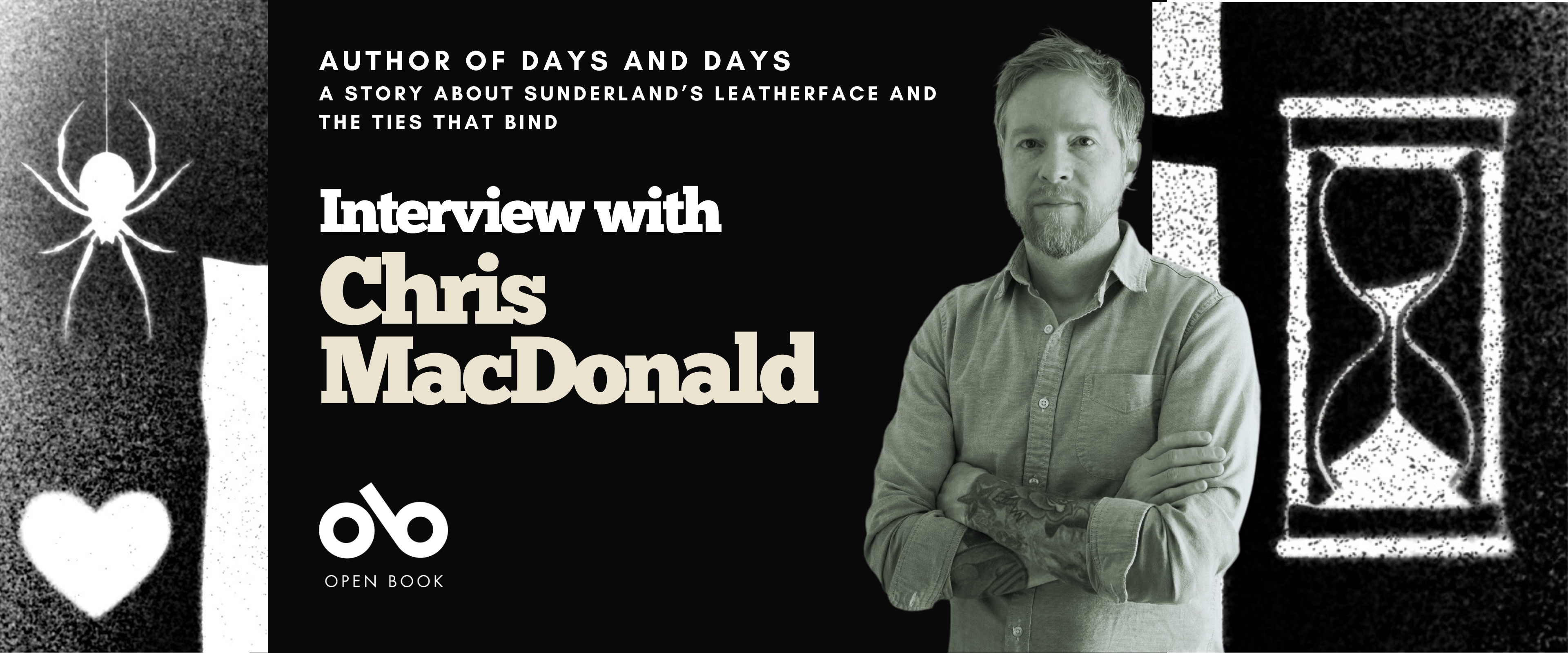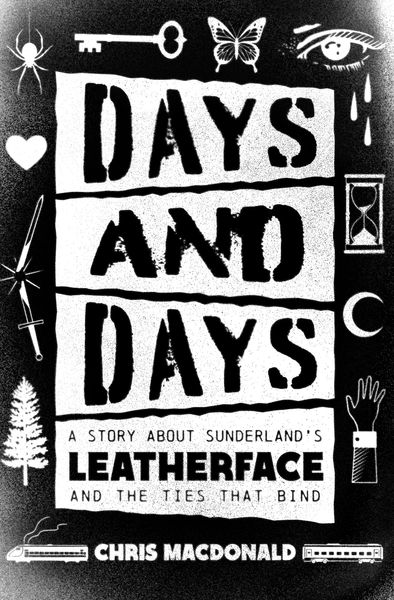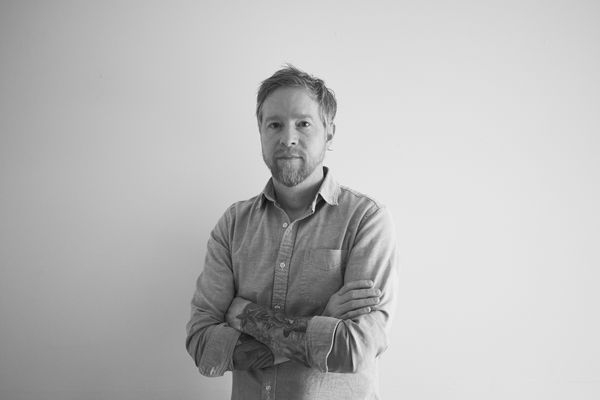Chris MacDonald Chronicles Two Friends' Revelatory Adventure Across the UK with a Truly Special 90's Punk Band
On a backpacking trip through the UK in 1999, Chris MacDonald and his friend Jason found themselves roughing it from country to country. They slept where they could, and were witness to a number of wild events, like a haunting at the top of a volcano and an epic storm. But all of that paled in comparison to their greatest achievement on the journey.
This was to follow the fabled Sunderland band Leatherface, who were called “the greatest British punk band of the modern era” by The Guardian. But, in these days, they were the heroes of a few young rebels who desperately wanted to experience the joy, chaos, and melancholy of a truly unique group and their music.
In Days and Days (ECW Press), the author weaves both of these threads together expertly in a singular travelogue that captures the freedom and energy of those years, and an incredible sojourn where two friends find themselves on a winding path of self-discovery. Their story is augmented by actual insights from the members of the band, who have generously spoken to the author about this era in their lives.
We crank it up to 11 in this True Story Nonfiction Interview with MacDonald, so read on to learn more about the riveting memoir and how it came to be.
Open Book:
Tell us about your new book and how it came to be. What made you passionate about the subject matter you’re exploring?
Chris MacDonald:
Days and Days weaves together two stories. The first follows a friend and I on a life changing backpacking trip through England, Ireland, and Scotland in 1999 where we meet up with the highly influential U.K. punk band Leatherface. If we’d known this would happen when we listened to their music for the first time as teenagers, we wouldn’t have believed it. The second story is an atypical biography of the group told through the lens of past and current members, friends, and various musicians. Though I listen to punk less than I once did, Leatherface has remained special to me. This is a band that I believe has made an impassioned contribution to the human experience. I realize that some of my early inspiration and interest in words can be rooted in Frankie Stubb’s lyrics, and how he delivers them. It can be very poetic and affecting. They are a band that shapeshifts in a way. At first listen, Leatherface might live up to the image of the film character, conjuring grizzly, brash images, with guitars that sound quite literally like chainsaws. Something changes as you listen closer to the messages and spend time with their music. You begin to imagine the leather face of a book, or the wise face of an elder.
OB:
What do you need in order to write – in terms of space, food, rituals, writing instruments?
CM:
When I began writing, I only needed time and some semblance of quiet. I’ve been an artist for the better part of my life, and it gets difficult to balance the responsibilities of owning a shop, tattooing, having a family, playing in a band, and writing. I’ve never been one to waste time. If I want to make something, I have to move quickly. If I want to paint, I’m usually at it within twenty minutes of my initial inspiration. It’s been a beautiful year for me. I received a grant for Days and Days from the Toronto Arts Council. The funding allowed me to take more time off than usual, but it also gave me the opportunity to write in new atmospheres. I was never one to listen to music when I wrote, but this summer I discovered that I love listening to music when writing. I stuck to a rigid schedule and it worked for me. It’s easy to dream about writing, and the hardest part is walking over to the computer. I know now that once I’m seated, even if I struggle at first, I just plow through and eventually I’ll get to the sweet stuff. I suppose a life of visual art prepped me with discipline.
OB:
What does the term creative nonfiction mean to you?
Your CanLit News
Subscribe to Open Book’s newsletter to get local book events, literary content, writing tips, and more in your inbox
CM:
I think my first brush with the creative nonfiction genre was Jack Kerouac’s Visions of Gerard, oddly enough. The meditations in this book, from what I understand, stem from real occurrences and memories, but are layered with literary embellishments. It’s the type of book I feel he wrote only for himself. This style of writing really impacted me. Flea from Red Hot Chilli Peppers’ memoir, Acid for the Children, was also fascinating not only because of Flea’s jarring honesty, but for the strong poetic undertone that he gave it. I think this is what I get from the term creative nonfiction. It’s decorating what is actual. Exaggeration in its most earnest form. It felt natural to venture into this during Days and Days because I was writing about a band that never seemed to fit into any clear genre. Where they sit as musicians gets difficult to decipher. This genre allows a writer to make things a little dreamy, which I enjoy.
OB:
Do you remember the first moment you began to consider writing this book? Was there an inciting incident that kicked off the process for you?
CM:
Quite honestly, as the trip that Jason and I took was coming to an end, a natural climax happened. Life imitates fiction as they say. It was a light bulb moment for sure. I could see the story in its entirety. I just didn’t have the skills then to formulate it properly. The real work began many years after. I started Days and Days as Toronto went into its first extended lockdown. My tattoo shop was closed. Even the extensive television job I was working at on the side was shuttered. Creating has always been my way of turning low feelings into highs. I just started typing, knowing that within the backpacking trip there would be a lot to say about friendship. It felt comforting to write about travelling when it wasn’t allowed. It was calming to write about music when live performances couldn’t happen. And the chance to speak about Leatherface in a way that I’ve always wanted to pushed me forward. Though I hoped for it deep down, I truly didn’t expect the project to get picked up.
OB:
Did you write this book in the order this appears for readers? If not, how did it come together during the writing process?
CM:
The order of the book is quite different from its initial incarnation. The first draft of the manuscript focused more on travel. It was a conscious decision to preserve the band’s mystique. It’s hard to say how much my literary agent, Dave Bidini, liked the first draft to tell you the truth. But, after a week or two, Bidini came back to me with the suggestion that I push the Leatherface aspect and pull back the travelogue and perhaps start the story at a different point of the journey. He agreed that there was something interesting about the band and the fact that nobody had written about them in this capacity was a good thing. I wasn’t sure if I was going to pull it off. But what I had on my side was how passionate I felt about the band. Days and Days was then given to my editor Michael Holmes. He could see that I was onto something, but felt the manuscript needed fine tuning. Michael pushed me to thread the connective tissue throughout. It was tricky to get the two stories to flow together. In hindsight, I feel I could have done this better, but it’s so hard to learn these things in the moment. Often, it isn’t until the work is beyond the point of no return do you fully understand how you could have done it differently. I’m so grateful for Bidini and Holmes.
OB:
What are you working on now?
CM:
I’m currently working on a novel. I grew up a fan of horror ever since watching the ‘80s film The Changeling as a kid. I’ve always wanted to write a ghost story and am very excited that it’s nearing completion. Writing fiction is quite a shift from memoir and nonfiction obviously. I started out writing fiction, so, it feels comforting to return to the genre. Although, it comes with a new set of things to stress about, just I was getting accustomed to the anxieties that nonfiction can bring.
______________________________________________
Chris MacDonald is a writer and tattoo artist based in Toronto. His first book, The Things I Came Here With, was called “a heartfelt memoir with wide appeal” by Library Journal and was nominated for the 2023 Heritage Toronto Book Award.






